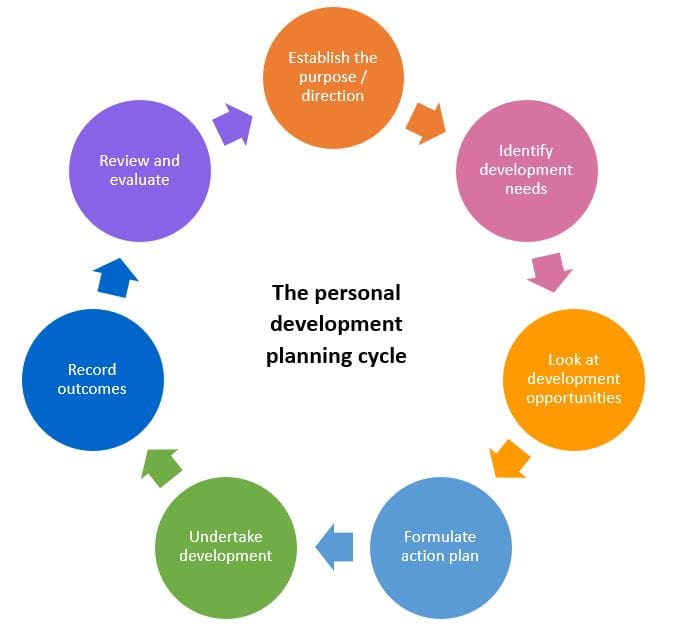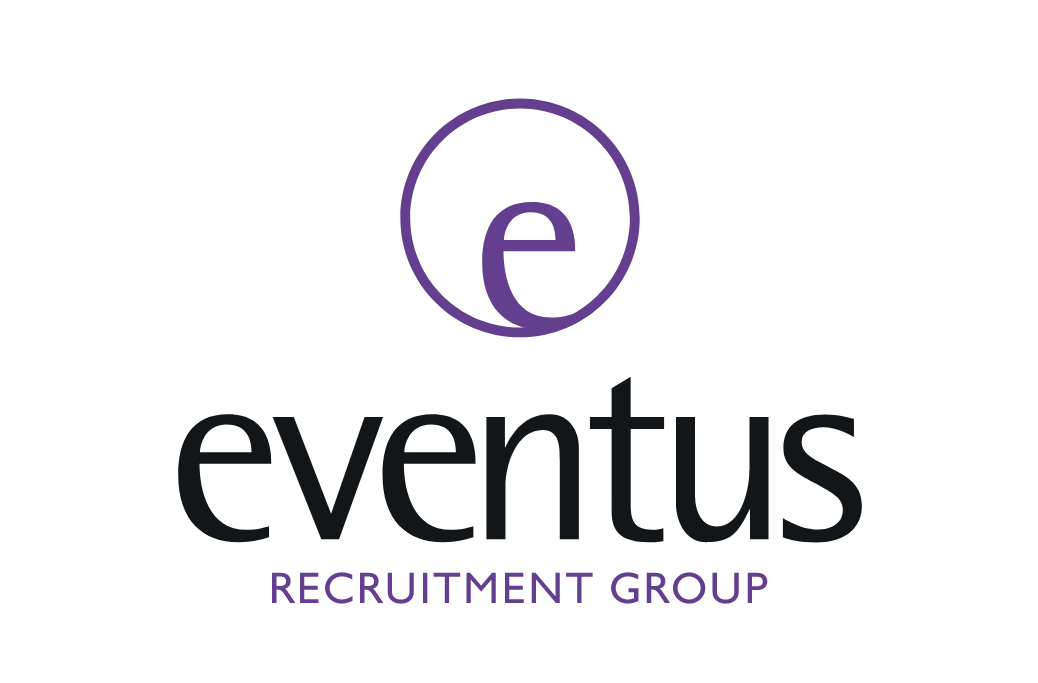It is important to undertake continuous professional development related to your role and see this as an ongoing professional development planning cycle.
What is currently stopping you from being as successful as you feel you can be in your professional life?
Personal development planning (PDP) is the process of:
- establishing aims and objectives – what you want to achieve or where you want to go, in the short, medium or long-term in your career
- assessing current realities
- identifying needs for skills or knowledge
- selecting appropriate development activities to meet those needs.
PDP is best understood as a cyclical process, where improvement comes from moving around the loop. The following chart outlines the process:

Professional Development Planning Cycle Step One – Establish your purpose/direction
The first step of your PDP is to identify the purpose of your personal development. You can do this alone or you may choose to work with your manager, colleagues, friends or mentors. Stage one involves:
- gaining an awareness of your current standing and future potential within your chosen field or sector
- gaining a measure of what you are good at and interested in (because these things will motivate you)
- taking account of the organisational (and sectoral) realities you encounter
- linking your plans to organisational (and sectoral) needs as much as possible.
In doing this, think about:
- your own value system, involving private life and family, work and money, constraints and obstacles to mobility, now and in the future
- the characteristics of the kind of work that fits with your value system.
Professional Development Planning Cycle Step Two – Identify development needs
The next step is to identify the need for your personal development. This may emerge from taking on new tasks or responsibilities, from discussions with your manager including formal PDP discussions, or from dissatisfaction with current routines. Some people know what they are good at, others may be less sure. You can use various processes such as self-assessment tests, benchmarking exercises and personal diagnostics to assess your skills in a structured way. One example, is the personal competency framework designed by the European Management Association. Click here to access
Professional Development Planning Cycle Step Three – Identify learning opportunities
In this step you identify and draw up a list of opportunities to gain the skills or knowledge you need to acquire, update or improve. Compare the list with your current skills and knowledge base and identify any gaps.
Think about:
- how you like to learn
- your development opportunities – in your own organisation, government and private advisory agencies, literature and open learning, multi-media or online packages, professional institutes, your peer groups, networks and colleagues, and family and friends
- the range of learning options available.
Professional Development Planning Cycle Step Four – Formulate an action plan
Set development objectives for each of the skills and knowledge gaps you identify. These objectives should:
- be SMART: Specific, Measurable, Achievable, Realistic and Timely
- have an element of challenge in them so that they stretch you as an individual and carry you on to new ground
- be attainable and viable within a realistic time frame
Failing to reach your set objectives could have a negative impact and make you wary of further personal development. To avoid this, create mini-milestones to motivate yourself, for example ‘within one year I would like to have achieved this, and the first step is to do X within one month’.
In today’s digital age, it’s important not to forget about your online presence when professional development planning. Extending your professional online presence should be part of your action in order to reach your professional development goals. Having an online presence can in essence be a digital CV. Moreover, you can spread your expertise and share knowledge to a wider audience through platforms such as LinkedIn. Ultimately building useful connections and sourcing opportunities to support your professional development. To read more about creating and building a professional online presence, view our guide here.
Professional Development Planning Cycle Step Five – Undertake the development
Put your plan into action – what you do and how you do it should be your choice. In addition to training courses you could also take up:
- work shadowing
- secondment
- job rotation
- project work
- networking and community involvement.
This action plan should be monitored and adjusted if circumstances change.
Professional Development Planning Cycle Step Six – Record the outcomes
Keeping records will help you to focus on what you have got out of your development activity. Record the date, the development need identified, the chosen method of development, the date(s) when development was undertaken, the outcomes, and any further action needed.
Professional Development Planning Cycle Step Seven – Evaluate and review
Evaluation is the key stage in the self-development cycle. There are two issues you should reflect upon: whether the development activity you have undertaken was appropriate and worthwhile; and whether your skills or working behaviour have improved as a result and how.
Ask yourself the following questions:
- What am I able to do better as a result?
- Has this experience thrown up further development needs?
- How well did this development method work?
- Could I have gained more from this activity?
- Would I follow this approach again?
We have previously discussed personal development plans on this blog. These should be reviewed and updated regularly. A personal development plan needs to include SMART objectives so you can achieve your plan, along with development activities to help you achieve these objectives.
You may find the following, useful reading (click to open new link) in developing your professional development planning cycle:
Maintaining A Work Life Balance
Receive a Tailored Service from The Eventus Recruitment Group
Here at the Eventus Recruitment Group, we offer realistic, honest and straight forward advice to enhance your career. We can help you to find your next opportunity at no cost to you as a candidate. We recruit for all roles within the legal, HR, Finance and Accountancy sectors. To view our latest jobs, please click here.
We also support you in applying for jobs through finding suitable roles that fit your requirements and skills, CV writing and preparing you for interviews. Get in touch for a confidential discussion.
If you would like help hiring for a vacancy, please click here to contact us.
Follow us on Facebook, Twitter and LinkedIn for the latest jobs and updates from us.

